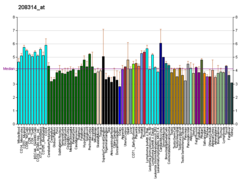Peropsin
| RRH | |||||||
|---|---|---|---|---|---|---|---|
| Identifiers | |||||||
| Aliases | RRH, retinal pigment epithelium-derived rhodopsin homolog | ||||||
| External IDs | MGI: 1097709 HomoloGene: 55977 GeneCards: RRH | ||||||
| RNA expression pattern | |||||||
 |
|||||||
| More reference expression data | |||||||
| Orthologs | |||||||
| Species | Human | Mouse | |||||
| Entrez |
|
|
|||||
| Ensembl |
|
|
|||||
| UniProt |
|
|
|||||
| RefSeq (mRNA) |
|
|
|||||
| RefSeq (protein) |
|
|
|||||
| Location (UCSC) | Chr 4: 109.83 – 109.84 Mb | Chr 3: 129.8 – 129.82 Mb | |||||
| PubMed search | |||||||
|
|
|||||||
Peropsin, a visual pigment-like receptor, is a protein that in humans is encoded by the RRH gene.
Peropsin is an opsin and so belongs to the guanine nucleotide-binding protein (G protein)-coupled receptors. Peropsin genes have seven-exons as neuropsin and RGR-opsin genes.
The peropsins are one of the four subgroups of the Go/RGR opsins, also known as RGR/Go or Group 4 opsins. Go/RGR opsins are one of the four major groups of type-II opsins, also known as metazoan or animal opsins. The Go/RGR opsins consist of four groups: The Go-opsins, the RGR-opsins, the peropsins, and the neuropsins. Animal opsins belong to four classes: C-opsins (ciliary), R-opsins (rhabdomeric), Cnidops (cnidarian), and Go/RGR-opsins. Three of these subclades occur only in Bilateria (all but Cnidops). However, the bilaterian clades constitute a parphyletic taxon without the Cnidops.
This article incorporates text from the United States National Library of Medicine, which is in the public domain.
...
Wikipedia
